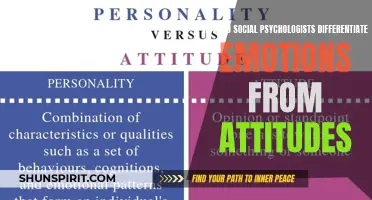
High emotional intelligence refers to the ability to understand, manage, and express emotions effectively. It involves being aware of one's own emotions, as well as the emotions of others, and being able to navigate relationships and social situations with empathy and composure. People with high emotional intelligence are often seen as good communicators, problem solvers, and leaders, as they have a deep understanding of themselves and others, allowing them to build strong connections and navigate conflicts with ease. Having high emotional intelligence can have a profound impact on both personal and professional relationships, leading to greater success and fulfillment in all areas of life.
| Characteristics | Values |
|---|---|
| Self-awareness | Recognizing and understanding one's own emotions, strengths, weaknesses, values, and goals. |
| Self-regulation | Controlling and managing one's own emotions and impulses in challenging situations. |
| Empathy | Sensing and understanding the emotions and perspectives of others. |
| Social awareness | Being aware of and understanding the emotions and dynamics of groups and social situations. |
| Relationship management | Building and maintaining healthy and positive relationships, resolving conflicts, and inspiring and influencing others. |
| Adaptability | Being flexible and open to change, able to adjust to new situations and challenges. |
| Optimism | Having a positive outlook, seeing the best in oneself and others. |
| Self-motivation | Being driven and motivated, able to set and work towards personal and professional goals. |
| Emotional resilience | Being able to bounce back and recover from setbacks and adversity. |
| Emotional control | Maintaining composure and not letting emotions overwhelm or control one's actions and decisions. |
| Assertiveness | Expressing one's thoughts, needs, and emotions clearly and respectfully. |
| Active listening | Fully focusing on and understanding what others are saying and feeling. |
What You'll Learn
- How can someone develop high emotional intelligence?
- What are the characteristics of someone with high emotional intelligence?
- How does high emotional intelligence affect relationships and communication?
- Can high emotional intelligence be measured and assessed?
- What are the benefits of having high emotional intelligence in the workplace?

How can someone develop high emotional intelligence?
Do you ever find yourself reacting emotionally or impulsively in certain situations? Do you have difficulty managing your emotions or understanding the emotions of others? If so, you may benefit from developing high emotional intelligence.
Emotional intelligence refers to the ability to perceive, understand, and manage emotions effectively. It includes skills like empathy, self-awareness, and emotional regulation. Developing high emotional intelligence can have a profound impact on your relationships, career, and overall well-being.
So, how can you develop high emotional intelligence? Here are some scientifically-backed strategies, steps, and examples to help you on your journey:
- Self-reflection and self-awareness: Start by taking the time to reflect on your own emotions and reactions. Notice patterns in your thoughts, feelings, and behaviors. Ask yourself why you react a certain way in specific situations. For example, if you tend to get anxious before public speaking, reflect on the underlying fear or insecurity that may be driving your emotions.
- Practice mindfulness: Mindfulness is a powerful tool for developing emotional intelligence. It involves paying attention to the present moment without judgment. By being fully present and aware of your thoughts and emotions, you can better understand and regulate them. For instance, you can practice mindfulness by focusing on your breath when you feel overwhelmed or stressed.
- Develop empathy: Empathy is the ability to understand and share the feelings of others. To develop empathy, actively listen to others and try to put yourself in their shoes. Imagine how they might be feeling and why. Practice empathy by engaging in compassionate conversations and helping others when they are in need. For instance, if your friend is going through a tough time, try to understand their perspective and provide emotional support.
- Learn to manage emotions: Emotional intelligence involves effectively managing your own emotions and the emotions of others. Start by learning to recognize and label your emotions. Instead of suppressing or ignoring them, let yourself fully experience and express them in a healthy way. For example, if you're feeling angry, find a constructive way to vent or release your anger, such as exercising or journaling.
- Seek feedback and learn from it: Ask for feedback from trusted friends, family, or colleagues about your emotional intelligence skills. Request specific examples of situations where you may have excelled or struggled. Use this feedback as an opportunity for growth and improvement. For instance, if someone tells you that you often come across as dismissive, reflect on how you can become more attentive and validating in your interactions.
- Practice emotional regulation: Emotional regulation is the ability to manage and control your own emotions. It involves recognizing when you're becoming overwhelmed or reactive and taking steps to calm yourself down. For example, if you're feeling overwhelmed, you can take a few deep breaths, count to ten, or engage in a relaxation technique like progressive muscle relaxation.
Remember, developing high emotional intelligence is a continuous process that requires patience, self-reflection, and practice. By cultivating self-awareness, empathy, and emotional regulation, you can develop stronger relationships, make better decisions, and lead a more fulfilling life. Start by implementing these strategies in your daily life and watch your emotional intelligence flourish.
The Evolution of an Emotional Affair into a Physical Encounter
You may want to see also

What are the characteristics of someone with high emotional intelligence?
Emotional intelligence refers to a person's ability to understand and manage their own emotions as well as recognize and empathize with the emotions of others. It has become recognized as a crucial trait for success in both personal relationships and professional settings. Individuals with high emotional intelligence possess a set of distinct characteristics that enable them to navigate social interactions with ease and provide support and understanding to those around them.
One characteristic of someone with high emotional intelligence is self-awareness. These individuals have a deep understanding of their own emotions, strengths, and weaknesses. They can accurately identify and label their feelings and are in tune with the impact their emotions have on their behavior and decision-making. This self-awareness allows them to regulate their emotions effectively and make sound choices in difficult situations.
Another characteristic of individuals with high emotional intelligence is empathy. They have the ability to understand and share the feelings of others, putting themselves in someone else's shoes. This empathy enables them to connect with people on a deeper level and offer support and understanding. They are skilled at picking up on non-verbal cues and can intuitively understand what others might be thinking or feeling. This makes them excellent communicators and fosters strong and meaningful relationships.
Individuals high in emotional intelligence also possess strong social skills. They are adept at managing relationships and excel at communication and conflict resolution. They are skilled at building and maintaining networks and are seen as trustworthy and reliable by those around them. These individuals can adapt their communication style to suit different situations and personalities, allowing them to connect with a wide range of people effectively.
Furthermore, someone with high emotional intelligence is skilled at managing their own emotions and those of others. They can control their impulses, stay calm under pressure, and demonstrate emotional resilience. These individuals have a positive mindset and can effectively manage stress and adversity. They are less likely to become overwhelmed by emotions and can think clearly and rationally in challenging situations.
One example of someone with high emotional intelligence is a manager who can effectively lead a team. This individual possesses self-awareness and understands their own emotions and the impact they have on their team's dynamics. They can empathize with their team members and address any concerns or conflicts in a timely and effective manner, fostering a positive and productive work environment. Their social skills allow them to build strong relationships with team members, resulting in increased collaboration and teamwork.
In conclusion, individuals with high emotional intelligence possess several key characteristics that set them apart. These include self-awareness, empathy, strong social skills, and the ability to manage their own emotions and those of others. These traits enable them to navigate social interactions effectively and provide support and understanding to those around them. Individuals with high emotional intelligence are adept at building and maintaining relationships and are often successful in both personal and professional settings.
Navigating the Road to Healing: Moving On After an Emotional Affair
You may want to see also

How does high emotional intelligence affect relationships and communication?
The concept of emotional intelligence (EI) refers to the ability to recognize, understand, and manage our own emotions, as well as the ability to recognize and understand the emotions of others. This form of intelligence plays a crucial role in our relationships and communication with others, as it helps us navigate and respond appropriately to various emotional cues and situations.
When individuals possess a high level of emotional intelligence, they are more likely to have healthier and more positive relationships. They have a greater awareness of their own emotions and can regulate them effectively, which reduces the likelihood of impulsive or harmful behaviors. This self-awareness extends to their interactions with others, allowing them to be more empathetic and understanding.
Effective communication is a central aspect of healthy relationships, and emotional intelligence directly impacts communication skills. People with high emotional intelligence are better able to express their feelings and thoughts in a clear and respectful manner, resulting in fewer misunderstandings and conflicts. They also possess excellent listening skills and are attentive to both verbal and nonverbal cues, enabling them to better understand the needs and emotions of others.
Here are some ways in which high emotional intelligence positively impacts relationships and communication:
- Improved empathy: Those with high EI are more attuned to the emotions and needs of others. Consequently, they are better able to validate and understand their partner's perspective, leading to increased trust and intimacy.
- Conflict resolution: Emotional intelligence allows individuals to navigate conflicts with sensitivity and respect. They can effectively manage their own emotions during disagreements and respond to their partner's emotions in a constructive and understanding manner. This promotes healthy resolution and prevents the escalation of conflicts.
- Effective listening: High emotional intelligence fosters active and empathetic listening. Rather than waiting for their turn to speak, emotionally intelligent individuals seek to genuinely understand their partner's perspective. This promotes open communication and deepens the connection between partners.
- Emotional regulation: Individuals with high emotional intelligence have a greater ability to manage their own emotions. This means they are less likely to react impulsively or irrationally during challenging situations. Instead, they can respond in a calm and collected manner, fostering a nurturing and supportive environment.
- Increased self-awareness: Emotional intelligence allows individuals to have a deeper understanding of their own emotions and triggers. With this awareness, they can effectively communicate their needs, boundaries, and desires to their partner. This promotes authenticity and transparency in the relationship.
- Trust and intimacy: High emotional intelligence promotes trust and intimacy as it allows individuals to be vulnerable with one another. The ability to recognize and communicate emotions fosters a sense of safety, enabling partners to open up and build emotional connections.
In summary, high emotional intelligence is a crucial factor in fostering healthy relationships and effective communication. It allows individuals to better manage their own emotions and respond empathetically to the emotions of others. By enhancing empathy, conflict resolution, listening skills, emotional regulation, self-awareness, trust, and intimacy, emotional intelligence positively influences the quality and longevity of relationships. Cultivating emotional intelligence is therefore essential for building and maintaining fulfilling relationships.
The Emotional Toll: How Emotional Abuse Can Cause Lasting Pain
You may want to see also

Can high emotional intelligence be measured and assessed?
Emotional intelligence refers to a person's ability to recognize, understand, and manage their own emotions, as well as the emotions of others. It plays a crucial role in our personal and professional relationships, as well as our overall well-being. Many researchers and experts believe that emotional intelligence can be measured and assessed, although it is a complex construct that cannot be captured by a single test or measure.
One of the most commonly used measures of emotional intelligence is the Emotional Quotient (EQ) test. This test typically involves answering a series of questions that assess various aspects of emotional intelligence, such as self-awareness, empathy, and emotional regulation. However, it is important to note that the EQ test is just one tool among many, and it may not capture the full range of emotional intelligence.
In addition to self-report measures like the EQ test, researchers have also developed performance-based assessments to measure emotional intelligence. These assessments often involve tasks that require individuals to accurately interpret and respond to emotional cues, such as facial expressions or tone of voice. For example, participants may be shown a series of pictures depicting different facial expressions and asked to identify the corresponding emotions. These performance-based assessments provide a more objective measure of emotional intelligence, as they are less susceptible to biases and self-report biases.
It is worth noting that measuring emotional intelligence is not an exact science. Emotional intelligence is a complex construct that is influenced by a variety of factors, including genetics, upbringing, and life experiences. Therefore, no single measure or assessment can capture all aspects of emotional intelligence. Instead, researchers and practitioners often use a combination of measures to gain a more comprehensive understanding of an individual's emotional intelligence.
Despite the challenges of measurement, there is a growing body of evidence suggesting that emotional intelligence can be assessed and developed. For example, several studies have found that individuals with higher emotional intelligence are more successful in their careers, have better interpersonal relationships, and are more resilient in the face of stress and adversity.
So how can we develop our emotional intelligence? Research indicates that emotional intelligence can be improved through targeted interventions and training programs. These programs often focus on enhancing specific components of emotional intelligence, such as self-awareness, empathy, and emotional regulation. They may involve activities such as mindfulness practices, role-playing exercises, and feedback sessions.
In conclusion, while measuring and assessing emotional intelligence may be challenging, it is possible to gain insights into an individual's emotional intelligence through various measures and assessments. These measures can help individuals and organizations identify areas for improvement and develop strategies to enhance emotional intelligence. By cultivating emotional intelligence, individuals can improve their relationships, navigate challenges more effectively, and ultimately lead more fulfilling lives.
Why Emotional Abuse Victims Might Turn to Cheating for Comfort
You may want to see also

What are the benefits of having high emotional intelligence in the workplace?
Emotional intelligence, also known as EQ, is the ability to recognize, understand, and manage our own emotions, as well as the emotions of others. In the workplace, high emotional intelligence has become increasingly valued and sought after by employers. This is because individuals with high EQ are often able to navigate tricky situations with ease, communicate effectively, build strong relationships with colleagues, and make better decisions overall. In this article, we will explore the benefits of having high emotional intelligence in the workplace.
Improved Communication:
High emotional intelligence allows individuals to communicate their thoughts and feelings effectively. They are better able to express themselves and listen actively to others. This can lead to fewer misunderstandings and conflicts, as well as improved teamwork and collaboration. In addition, individuals with high EQ are skilled at reading non-verbal cues like body language and tone of voice, which helps them to understand the true meaning behind what is being said.
For example, imagine a team meeting where a colleague seems upset but is not voicing their concerns. A person with high emotional intelligence would be able to pick up on these non-verbal cues and approach the colleague privately to address the issue. This leads to open and honest communication, fostering trust and productivity within the team.
Effective Conflict Resolution:
Conflict is inevitable in the workplace, and individuals with high emotional intelligence are adept at resolving conflicts in a positive and constructive manner. They are able to remain calm in tense situations, control their emotions, and focus on finding a solution that benefits everyone involved.
When faced with a conflict, individuals with high EQ can step back and objectively analyze the situation, taking into account the emotions and perspectives of all parties involved. They can then use their empathy and understanding to find common ground and reach a compromise that satisfies everyone.
For instance, if there is a disagreement between two team members regarding a project, a person with high emotional intelligence would be able to listen to both sides, validate their emotions, and work towards finding a resolution that satisfies both parties. This not only resolves the conflict but also strengthens relationships and promotes a positive work environment.
Building and Maintaining Relationships:
High emotional intelligence is key to building and maintaining positive relationships in the workplace. Individuals with high EQ are empathetic and understanding, which allows them to connect with others on a deeper level. They are able to recognize and respond to the emotions of their colleagues, which helps to build trust and foster strong relationships.
Furthermore, individuals with high emotional intelligence prioritize active listening, validating others' emotions, and showing genuine interest in their colleagues’ well-being. These behaviors create a supportive and inclusive workplace environment where individuals feel valued and appreciated. Strong relationships also contribute to higher job satisfaction and increased employee engagement.
Effective Leadership:
Great leaders possess high emotional intelligence. They are able to inspire and motivate their team members, build strong relationships, and navigate complex situations with ease. Leaders with high EQ are skilled at recognizing and regulating their own emotions, as well as understanding the emotions of those around them.
For example, a manager with high emotional intelligence would be able to gauge the morale of their team and address any concerns or issues before they escalate. They would also be able to provide regular feedback and guidance in a way that is empathetic and constructive, motivating their team members to perform at their best.
In conclusion, high emotional intelligence plays a crucial role in the workplace. It enhances communication, resolves conflicts effectively, builds and maintains relationships, and fosters effective leadership. By developing and nurturing emotional intelligence, individuals can not only improve their own professional success but also contribute to a positive and productive work environment.
Breaking the Cycle: Ending Emotional Abuse Towards Your Wife
You may want to see also
Frequently asked questions
High emotional intelligence refers to an individual's ability to recognize, understand, and manage their own emotions, as well as the emotions of others. It involves being self-aware, empathetic, and skilled in interpersonal relationships.
High emotional intelligence can bring numerous benefits to individuals. It allows them to navigate social interactions more effectively by understanding and responding appropriately to the emotions of others. It also helps in managing stress and making better decisions. Additionally, high emotional intelligence fosters stronger interpersonal relationships and enhances communication skills.
Yes, emotional intelligence can be developed and improved over time with practice and self-reflection. By increasing self-awareness and learning strategies to regulate their emotions, individuals can enhance their emotional intelligence. It is a skill that can be learned and honed through various techniques such as mindfulness, empathy training, and effective communication.
There are several signs of high emotional intelligence. Those with high emotional intelligence are typically self-aware and able to recognize and understand their own emotions. They are also skilled in managing their emotions and have a greater capacity to empathize with others. Additionally, individuals with high emotional intelligence often excel at building and maintaining healthy relationships.
High emotional intelligence is closely linked to professional success. It enables individuals to work well in teams, collaborate effectively, and resolve conflicts. People with high emotional intelligence are often better leaders who can inspire and motivate others. Additionally, they tend to have strong communication skills and are adept at building and maintaining professional relationships. All these factors contribute to enhanced performance and career advancement.







